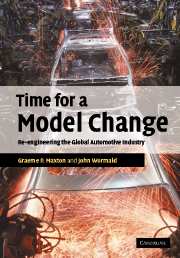Book contents
- Frontmatter
- Contents
- List of figures
- Foreword by G. Fredric Bolling
- Acknowledgements
- Glossary
- Introduction
- 1 From automania to maturity – in the main markets at least
- 2 The problems that can be fixed – dealing with noxious emissions, traffic accidents and congestion
- 3 The global resource challenges – energy and global warming
- 4 A global industry and the changing international order
- 5 The supplier industry – the catalyst for the profound changes to come?
- 6 The downstream sales and service sector
- 7 When the labels do not add up
- 8 Choosing a future for the automotive industry
- 9 Time for a model change
- Index
3 - The global resource challenges – energy and global warming
Published online by Cambridge University Press: 22 September 2009
- Frontmatter
- Contents
- List of figures
- Foreword by G. Fredric Bolling
- Acknowledgements
- Glossary
- Introduction
- 1 From automania to maturity – in the main markets at least
- 2 The problems that can be fixed – dealing with noxious emissions, traffic accidents and congestion
- 3 The global resource challenges – energy and global warming
- 4 A global industry and the changing international order
- 5 The supplier industry – the catalyst for the profound changes to come?
- 6 The downstream sales and service sector
- 7 When the labels do not add up
- 8 Choosing a future for the automotive industry
- 9 Time for a model change
- Index
Summary
When the wells run dry – the coming fuel and environmental crunch
Mankind seems to have an insatiable appetite for transport and mobility, which increases inexorably with rising wealth. As we get richer, we travel more. We live further from our places of work to find better housing. We visit our friends more, who live further away. We go further afield on holidays. We travel more on business. The ever rising trend is shown in figure 3.1 for different world regions.
Whereas a hundred years ago the typical distance someone would travel in Europe was 13 miles a year, today it is 13 miles a day. Figure 3.2 summarises the differences between different regions of the world. The white bars show income per head in 1985 US dollars. The black bars are passenger-kilometres per person per year. Each pair of bars represents a major grouping of economic power.
There is even a strangely universal law about how much we travel and how much we spend on it. Everyone in the world seems to spend about the same amount of time per year moving around – and the same proportion of income, as shown in figure 3.3 The difference is the means of locomotion employed, the resulting average speed and therefore the annual distance travelled. African villagers walk, Chinese workers cycle, the Japanese mostly use public transport, Europeans and Americans mainly drive. Some of the super-rich even commute by personal aeroplane.
As we get richer, the mix shifts decisively towards individual motorisation: the car.
- Type
- Chapter
- Information
- Time for a Model ChangeRe-engineering the Global Automotive Industry, pp. 64 - 90Publisher: Cambridge University PressPrint publication year: 2004



